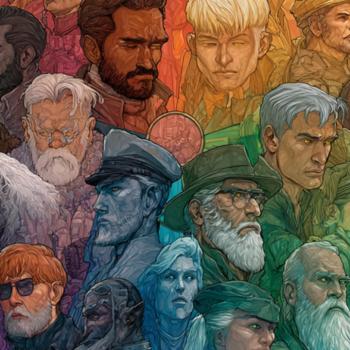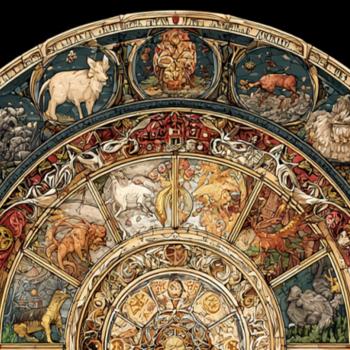The very first saying here comes from the Q-source document, but is quoted in an alternate from in Matthew 24, during what’s known as the Olivet Discourse. In that context, the quote seems to be about the suddenness of the coming of the Day of the Lord and the illustrations used there are quite similar to this one:
“Two men will be in the filed; one will be taken and one left. Two women will be grinding at the mill; one will be taken and one left.” [Mt. 24:40-41]
Unlike in that reference, the saying here is less apocalyptic in nature and only refers to the unpredictability of when we might physically die, at a time we do not expect. Perhaps even as we are reclining at the table enjoying a meal with a friend, as Jesus suggests here.
What follows next is an uncommon dialog between Jesus and one of his disciples. In this case, Salome, who identifies herself as one of his “female disciples.” We should note that many scholars reject this saying as a later addition to the text, but nevertheless, she was one of the disciples of Jesus, and she was a female, and what she says to Jesus in response to his statement is the bulk of this saying. So, let’s examine it a little closer, shall we?
Salome’s reaction to what Jesus says about there being two who recline on a couch and one will die and the other will live seems very practical. Because, as he says this, the two of them are, indeed, reclining on a couch together and sharing a meal. So, she cannot help but wonder if he’s suggesting that one of them – perhaps her – will die and the other will not. In this context, her response is quite expected because he has come to her house and is eating at her table and then, suddenly, seems to suggest that one of the is about to die. To this she says:
“Who are you, O man? Like a stranger you have gotten upon my couch and you have eaten from my table.”
This seems like a very normal reaction, doesn’t it? “Are you talking about me?” she seems to ask, and then becomes a little defensive to his statement as revealed in her observation that Jesus, “…like a stranger [has] gotten upon [her] couch and [has] eaten from [her] table.”
To paraphrase: “Hey! Who do you think you are? You come into my house, as my guest, sit on my couch, eat from my table, and then threaten me with sudden death?”
This seems to be the exact reaction that Jesus was going for since it opens her up to what he wants to say next:
“It is I who comes from that which is integrated. I was given of the things of my father.”
Or, to put it another way, “I am the one who is integrated or whole and complete; at one with everything and everyone. I am speaking only the things the Father has given me to say.”
To which Salome responds: “I am your disciple.”
This seems to have settled her down enough for what Jesus wants to elaborate on in his first statement:
“Therefore, I say that such a person, once integrated, will become full of light; but such a person, once divided will become full of darkness.”
His point being, that when she becomes “integrated” or “at one with Christ and all things”, she, too “will become filled with light” as he is. Otherwise, she will remain divided, or “un-integrated” with Christ, and become filled with darkness, or death.
So, the death and life statements at the beginning appear to be less about physical death and more about spiritual life and spiritual death; or living in a state of light or a state of darkness.
The most practical way of looking at this saying is that Jesus is observing that, on this woman’s couch, there are two people: one of them is alive and “integrated” and the other is dead, or “unenlightened” to the truth.
We’re not sure if Salome had previously understood the many sayings of Jesus about becoming One with Christ and had only, temporarily forgotten them, which may have been why Jesus felt the need to gently remind her of the illusion of separation. Or, if she perhaps was a new disciple who was only hearing these teachings for the first time.
Either way, Jesus used the occasion to point her towards the reality of Oneness and the necessity of remaining aware of where life originates (in our connection with God), and where death comes from (in being blinded to our inherent oneness with Christ).
**

Sola Deus: What If God Is All Of Us? by Keith Giles is now available on Amazon in Paperback and on Kindle.
Keith Giles is the best-selling author of the Jesus Un series. He has appeared on CNN, USA Today, BuzzFeed, and John Fugelsang’s “Tell Me Everything.” He hosts the Second Cup with Keith podcast, and co-hosts the Apostates Anonymous podcast, and the Heretic Happy Hour Podcast. Find out more about his online courses HERE>















